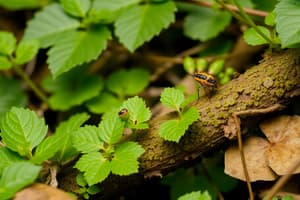Podcast
Questions and Answers
What is ecology?
What is ecology?
Ecology is a branch of biology that studies the relationships between living organisms and their environments.
Who can be credited with early discoveries in ecology?
Who can be credited with early discoveries in ecology?
Robert Hooke, who made early discoveries in cell biology in 1665.
What are ecosystems?
What are ecosystems?
Ecosystems are communities of living organisms and their interactions within specific geographic areas.
Name a scientist whose work has significantly contributed to our understanding of ecology.
Name a scientist whose work has significantly contributed to our understanding of ecology.
What are primary producers in an ecosystem?
What are primary producers in an ecosystem?
What is the importance of food webs and food chains in ecology?
What is the importance of food webs and food chains in ecology?
Define mutualism and its significance in ecological systems.
Define mutualism and its significance in ecological systems.
Explain the concept of biodiversity and its importance in ecosystems.
Explain the concept of biodiversity and its importance in ecosystems.
What is ecological succession and how does it contribute to ecosystem changes?
What is ecological succession and how does it contribute to ecosystem changes?
How have human activities impacted ecosystems according to the text?
How have human activities impacted ecosystems according to the text?
Study Notes
Title: Exploring Ecology: The Intricate World of Biological Interactions
Ecology, a captivating branch of biology, concerns itself with the intricate relationships between living organisms and their environments. It encompasses the study of the distribution, abundance, and interactions between species and the factors that influence their well-being. Our exploration of ecology will delve into various subtopics that illuminate its importance and the fascinating discoveries made in this field.
1. The History of Ecology
Ecology can be traced back to the early discoveries of cell biology by Robert Hooke in 1665. Since then, the field has grown to encompass not only the microscopic world of cells but also the expansive landscapes of ecosystems. As we unveil the history of ecology, we encounter the groundbreaking work of scientists like Charles Darwin, Charles Elton, and Rachel Carson, whose discoveries have shaped our understanding of how species interact and how ecosystems function.
2. Ecosystems: The Building Blocks of Ecology
An ecosystem is a community of living organisms and their interactions within a specific geographic area. It is characterized by a flow of energy and nutrients through the system, which includes primary producers (such as plants), primary consumers (such as herbivores), secondary consumers (such as predators), and decomposers (such as bacteria). The balance between these elements is crucial for maintaining a healthy ecosystem, as each organism plays a unique, interconnected role in the system.
3. Food Webs and Food Chains
Food webs and food chains are essential components of ecology, depicting the flow of energy and nutrients through a community of organisms. They illustrate the relationships between species, demonstrating how the consumption of one organism can affect the abundance and distribution of others. Food webs and food chains also help to predict the effects of disruptions to the system, such as the introduction of an invasive species or the removal of a keystone species.
4. Species Interactions
Species interactions, such as predation, competition, and mutualism, are vital to the dynamics of ecological systems. Predation occurs when one species consumes another, while competition can take many forms, such as resource-based competition (for food, water, or shelter) or interference competition (for territory, mates, or resources). Mutualism, on the other hand, is a symbiotic relationship between two or more species, in which each benefits from the association. The study of species interactions is critical in understanding the structure and function of ecosystems.
5. Biodiversity and Ecosystem Services
Biodiversity, or the variety of life forms within a particular area, is crucial to the functioning of ecosystems. Different species have unique roles, and the loss of one species can result in cascading effects throughout the system. Ecosystem services, such as pollination, pest regulation, and water filtration, are the benefits that humans receive from maintaining healthy ecosystems. They are critical for our survival, yet biodiversity is under threat from habitat loss, climate change, and other human activities.
6. Ecological Succession and Disturbance
Ecological succession is the process by which an ecosystem changes over time due to the colonization of new species and the disappearance of others. Disturbance, such as a forest fire or a hurricane, can drastically alter an ecosystem, causing the system to recolonize and reorganize. The study of ecological succession and disturbance is essential in understanding the resilience and adaptability of ecosystems.
7. Human Impacts on Ecosystems
The human population has grown exponentially over the past century, resulting in an unprecedented impact on ecosystems. Human activities such as land use changes, pollution, overexploitation of resources, and climate change have resulted in the loss of biodiversity and a decline in ecosystem services. The study of ecology is crucial for understanding the consequences of human impacts on ecosystems and for developing strategies to mitigate these impacts.
In conclusion, ecology is a fascinating field that explores the complex relationships between living organisms and their environments. It is a vital discipline, helping us to understand the consequences of human activities on ecosystems and to develop strategies to mitigate these impacts. As our knowledge of ecology grows, so does our appreciation for the fragility and resilience of the world around us.
Studying That Suits You
Use AI to generate personalized quizzes and flashcards to suit your learning preferences.
Description
Dive into the captivating world of ecology with this quiz that covers the history of ecology, ecosystems, food webs, species interactions, biodiversity, ecological succession, human impacts on ecosystems, and more. Test your knowledge on the intricate relationships between living organisms and their environments.




